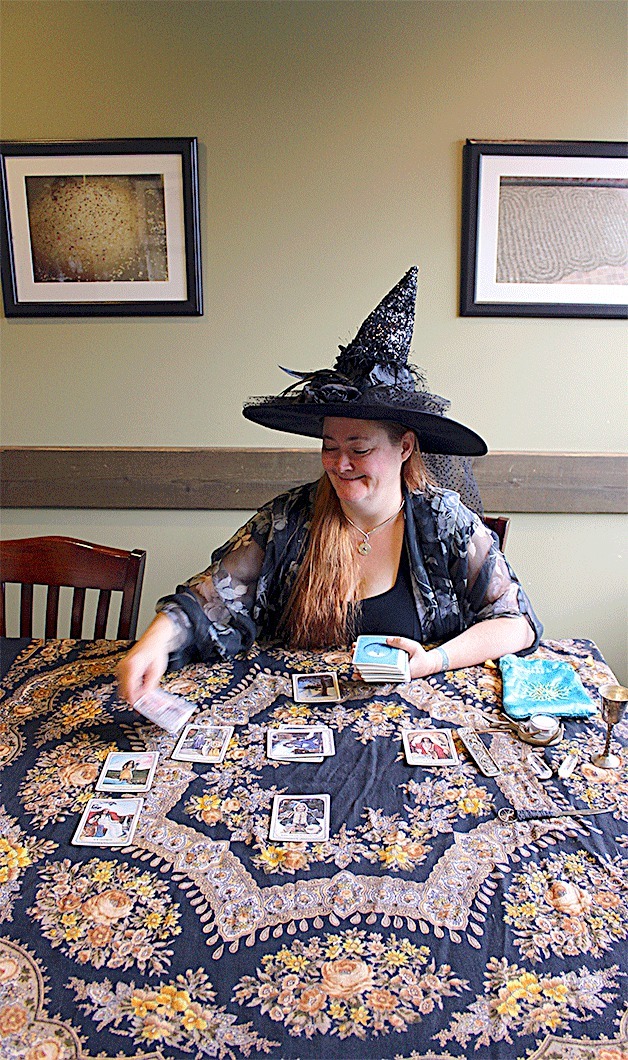In the days preceding All Hallow’s Eve, Tabitha Pierzchala’s pointed and brimmed black hat, adorned with sequins, black flowers and a flowing black veil, doesn’t appear to evoke more than a handful of curious glances from passerby.
At this time of year, it is not uncommon to see a myriad of characters, including witches, wraiths and wizards, strolling the streets or enjoying some sweet seasonal fare.
But the majority of these adopted identities are costumes depicting fictional beings, facades to be tossed off and stowed away until the next year’s Halloween.
Pierzchala, too, will cast off her hat when the holiday has passed. But her identity as a modern-day witch and Wiccan of the Georgian Tradition will remain.
PIERZCHALA, unlike many of her fellow witches, is “out of the broom closet,” and doesn’t perceive a need to hide her identity as a Wiccan and a witch. However, she said, she is generally a quiet observer of her faith, both at work and at home, which she shares with her devout Catholic mother-in-law.
“I don’t wear the pentacle on my sleeve. I don’t go running through the streets skyclad. I quietly celebrate my faith with other like-minded friends,” she said, adding that it’s a sense of mutual respect that she hopes to maintain with anyone of dissimilar religious beliefs.
Wicca is a neo-pagan religion whose rituals and theology stem from both ancient pagan and 20th century hermetic motifs.
Pierzchala is trained in both the Georgian Tradition of Wicca as well as druidry, and has been initiated as a priestess. While stationed in Iraq, Pierzchala acted as a distinguished faith leader on her ship, facilitating rituals and meetings.
PRINCIPLES OF Wiccan beliefs are rooted in nature, as are rituals and holy days including Samhain, the ancient Gaelic holiday from which modern Halloween evolved.
Samhain marks the end of the harvest season, the onset of the “darker half” of the year and, for many, a time of spiritual renewal. It is also a time at which the veil between this world and the spiritual otherworld or other side is believed to be at its thinnest.
For ancient pagans, it was thus a time to communicate with spirits and loved ones or ancestors who had passed.
“This would be the season of everything ending, everything coming to fruition,” said Aaron Taggert, friend of Pierzchala, fellow witch, shaman and leader of a neo-pagan church.
Taggert added that what is now known as Halloween also marked the time of year in which the cattle would be slaughtered. The priests, keepers of the calendar, determined how many to slaughter in order to sustain the townspeople through the winter without any meat going bad.
This element of the slaughter, he explained, is the reason Halloween celebrations invoke blood, gore and frightfulness.
However, contrary to many misconceptions, neither Wiccans or witches believe in, let alone worship, the devil or any other evil being.
THAT IS the primary grievance of many witches, Wiccans and other pagans of similar spiritual beliefs, including Adam Hayden, who goes by Maelgwyn in Pagan and Wiccan circles.
When Hayden was a child, his mother passed along “folkloric witchcraft” which had been passed to her from her mother.
Hayden’s father and stepmother, however, were less than understanding.
At age 18, Hayden said, he was kicked out of the house because of their conviction that his Wiccan beliefs were associated with devil-worship and “other horrific things” that do not exist in Wicca.
Even in adulthood, Hayden said, he finds it easier to coexist by keeping his religious practice secret.
It seems to be a common sentiment amongst Whidbey’s Wiccan, pagan and witch population. Some fear societal ridicule while others fear discrimination, or even the loss of employment.
THESE misconceptions are something Taggert, too, has grappled with.
For several years, he had attempted to conform to Christianity despite lifelong skepticism in regard to certain convictions.
As he struggled to determine his spiritual path, those who knew of his interest in paganism contended he was doomed to hell.
Several years after his commitment to paganism, Taggert said he has realized that Jesus is essentially one manifestation of a common idea.
If asked whether he prays or attends church, he simply replies, “yes.”
“The Hebrew word that we derive ‘church’ from is just a meeting place,” he noted, adding that for him, church may be in the forest or on a mountain top.
Though principally celebrating Samhain, Pierzchala, Taggert and Hayden each expressed that they take enjoyment in modern Halloween celebrations as well.
“I think it is very important that we not only keep alive the ancient traditions of Samhain, but realize that the modern traditions are just as valid. We may honor and respect the past, but we must remember that we do not live in the past,” Hayden said.
“So, taking children ‘trick or treating,’ bobbing for apples and other events are important. But being able to explain the origin of these traditions is also very important.”



